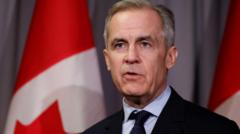Chris Wright, appointed by President Trump as energy secretary, has stirred controversy with his assertion that fossil fuels are crucial for improving the lives of the world's poorest. Critics argue this overlooks the rapid rise of renewable energy options.
Trump's Energy Chief Defends Fossil Fuels Amid Renewable Energy Debate

Trump's Energy Chief Defends Fossil Fuels Amid Renewable Energy Debate
Chris Wright argues fossil fuels are essential for global poverty alleviation, facing criticism for his views.
Chris Wright, the founder and CEO of Liberty Energy, is poised to take on the role of U.S. energy secretary under President Trump, and he has made a compelling moral argument for the continued use of fossil fuels. In a series of public statements and podcasts, Mr. Wright contends that oil, gas, and coal are indispensable for alleviating global poverty and enabling access to modern conveniences that people in wealthier nations often take for granted.
According to Mr. Wright, millions of individuals in developing countries still rely on rudimentary energy sources like wood, dung, or charcoal for basic necessities, such as cooking and heating. He expressed his strong belief that denying access to fossil fuels is akin to denying these populations a better quality of life. “It’s just naïve or evil to think they should never have washing machines or modern medicine,” he remarked on the “Mission Zero” podcast.
However, his assertions face growing backlash from environmentalists and advocates for clean energy. Critics argue that his arguments fail to acknowledge the increasing viability and affordability of renewable energy sources such as wind and solar power. Reports from the International Energy Agency highlight an "unprecedented rate" of global clean energy adoption that could potentially replace fossil fuel dependence.
Furthermore, opponents emphasize the climate ramifications of fossil fuel reliance, particularly on poorer nations, which are disproportionately affected by severe weather, rising sea levels, and droughts caused by climate change. "It's rather self-serving for the fossil fuel industry to assume that the future will simply replicate the past," stated Joseph Curtin, managing director at the Rockefeller Foundation, which is exploring ways to expand clean energy access in impoverished areas.
As the discourse surrounding energy policy and climate change intensifies, Wright's views play into a broader narrative about the balance between economic growth and environmental sustainability.






















